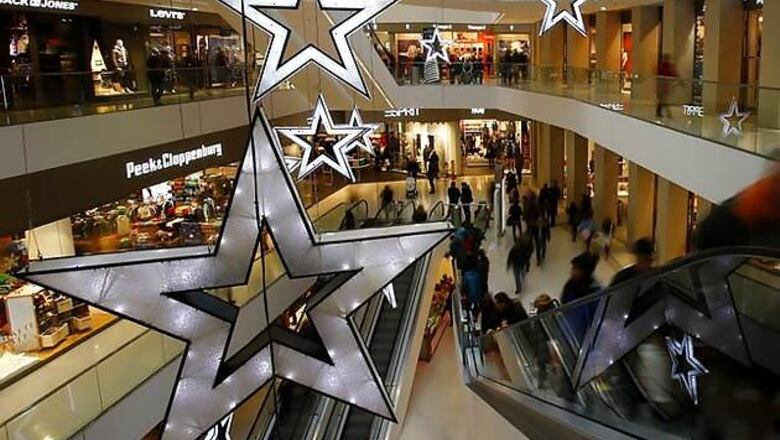
views
Cannes: As growing numbers of shoppers move online, European mall owners are looking to pull in customers by including services that can't be replicated on the Web like hospital care and government offices.
Malls must become more like full-service community centres to survive in the face of a growing list of failed retailers like HMV and Blockbuster, property experts at the annual MIPIM trade fair in Cannes, France, told Reuters.
On the flip side of that retail revolution, the experts see big gains in warehousing as more goods are sent and returned via post.
"The days of the stand-alone mall are numbered," said David Roberts, the chief executive of architect Aedas, one of the five largest practices in the world. The company has been involved in city masterplan projects in Asia, Europe and the Middle East.
"In 20 years time you will find stores that sell books and DVDs replaced by sites that give people a reason to go the mall ... art galleries, education centres and health and spa treatments."
Florencio Beccar, fund manager of CBRE Global Investors European shopping centre fund, cited the recent purchase of a mall in Germany, saying the fact it included a large medical centre was "a big plus".
"I once saw a clinic in a Brazilian mall where you checked in and are buzzed on a device when they are ready. In the meantime you go shopping," he said. "With the ageing population in Europe you can see that happening more and more."
CBRE Investors, which has about 14 billion euros ($18.2 billion) of retail property under management in Europe and 5,000 tenants, also owns a mall in southern Sweden with a library and a local municipal office, he said.
"More shopping centre developers will have early talks with these sorts of tenants as well as the big anchor retailers," Beccar said.
Mall owners like Land Securities, Intu, Westfield and Klepierre have increased the number of restaurants and cinemas to persuade shoppers to stay longer, and offer promotions to reward frequent shoppers who can be tracked via their mobile phones.
Community centres, adventure parks
But these steps don't go far enough, some experts say, in light of a forecast last month that 90 percent of retail sales growth in Britain, France and Germany between 2012 and 2016, or 91.5 billion euros, is expected to be online, according to the property arm of French insurer AXA, which manages 43 billion euros of assets.
As well as changing what's inside, mall owners will need to borrow ideas from developing markets like Dubai and China where centres are part of wider mixed-use developments where people live or include open spaces where they spend leisure time, Roberts said.
"Convenience and Internet shopping has created a breakdown in community structures and there's a gap there waiting to be filled," he said.
"There is a complete lack of vision among many shopping centre owners," said Joe Valente, a managing director at JP Morgan Asset Management, who helps manage 7 billion euros of real estate in Europe.
"The big thing that's missing is that unlike almost every other industry they haven't caught on to building their own brand. Why not have a bluewater.com?" he said, referring to the large mall of the same name in southeast England.
"Landlords fear cannibalizing sales but in 10 to 15 years they won't have a choice because they will be cannibalized anyway," he said. In other words, a growing number of shoppers will move online whatever malls do.
"On a mall website you could book a parking space, a restaurant table or your car to be valeted. Why do people go to Covent Garden?" he asked of the central London district.
"There's nothing there you won't find anywhere else but I would argue it's a strong brand."
Christian Ulbrich, chief executive for Europe, Middle East and Africa at property consultant Jones Lang LaSalle, said: "Stores will get bigger and become more like adventure parks that attack all of your emotions.
"For example, Globetrotter has a climbing wall and cycle track in its Frankfurt store to try out its products," he said of the German outdoor clothing and equipment retailer.
Warehousing
While retailers and mall owners struggle to find answers, all agree that warehouse property owners are the big beneficiaries of the change in retail habits.
Every additional 1 billion euros of online sales resulted in an average additional warehouse demand of approximately 72,000 square meters in Britain, Germany and France over the last five years, a report from warehouse landlord Prologis said last year.
"Logistics is the new retail," said Simon Hope, global head of capital markets at property consultant Savills, referring to the way changing consumer trends will affect the way investors see property.
"There is a trend of money moving away from all but the best and most regionally dominant malls into logistics as they are economically shielded," he said.
The fact that the Norwegian and Chinese sovereign wealth funds have recently invested in the sector, as well as a report that Brookfield, lower Manhattan's largest office landlord, is trying to do the same, shows serious bets are being made on logistics property, Hope said.
Yields for high quality logistics property can be six or seven percent versus four or five percent for top shopping centres.
As another example of how retailers may re-think their operations, some are likely to club together to operate out of smaller logistics sites close to city centres to enable same-day deliveries, a service increasingly in demand, Ulbrich said.
"The issue they all face is that shopping is no longer enough of a reason to go to shopping centres."




















Comments
0 comment